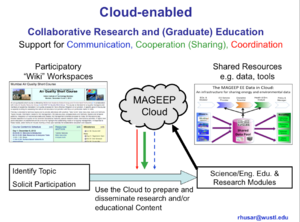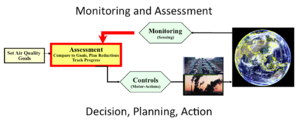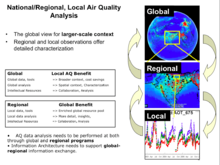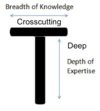Mumbai AQ course rationale, goals, approach, expected outcomes - rhusar
Background an Rationale
- Mega trends
The Vision and Goals of the Event
The broad vision is to extend the current small-scale, one-on-one collaborations into a broader, networked collaboration where the combined resources and the expertise of the network is capable of handling the major challenges of Energy and Environment. The specific goal of this initial effort is to apply and test a network-based collaboration for research and education with focus on: Monitoring and Assessment of PM Air Quality over India.
A tangible outcome of the effort is the spatial, temporal ad compositional characterization of PM which could be equally useful for assessing human health, climate or solar energy.
Web-Based Networking Infrastructure
This activity will be supported by a web-based information infrastructure, "MAGEEP Cloud" with capabilities for communication, cooperation through shared resources and coordination of joint activities in research and education The shared resources in the cloud can be tapped seamlessly by all interested users. Experts from various organizations can synergistically collaborate in research and collectively develop and deliver multimedia educational content.
The cloud-based cyber-infrastructure, will serve as a physical connectivity tissue and it will augment the current human networking in MAGEEP and IARG. Also, it will draw upon the extensive global-scale machine-machine AQ data networking facilitated by the GEO AQ CoP using systems such as ‘DataFed” for data sharing, processing and visualisation.
The basic technological capabilities for cloud-based communication, cooperation and coordination exist but their application to education and research is in its infancy. For this reason we envision a staged iterative, feedback-driven approach toward implementation. This Mumbai AQ short course is the initial demonstration.
During and following the live sessions in Mumbai, participants will be asked to provide feedback and suggestions on the web-supported collaboration.
Anticipated Outcomes and Benefits
Support to Air Quality Management
AQ management will be supported by covering the topic of Monitoring and Assessment (M & A) of Air Quality, with focus on Particulate Matter (PM) as a multi-species with strong relevance to the management of public health, climate and solar energy.
Air quality control strategies and technologies are beyond the scope of the current activity. However, the outcome of this PM monitoring and assesment effort is intended for the development of effective PM management strategies and their implementation.
Support to Monitoring and Assessment Research
Monitoring and Assessment research will be supported by
- Combining measurements from surface-based and satellite sensors
- Iteratively reconciling the AQ observations, models and emissions.
- Integrating global, regional and local measurements and knowledge
- Characterize PM so the knowledge will have multiple societal benefits: i.e the effects on health, climate , solar energy etc..
The choice of specific research areas as well as the clustering of collaborators is to be driven by the initiatives of their voluntary participants and enabled by a shared information infrastructure.
Support for Education for AQ Monitoring and Assessment
‘Deep’ learning modules for more detailed understanding of sub-topics will support education. Deep modules can be prepared by the traditional (or newer on-line) methods of science education.
‘Crosscutting’ learning modules are required for complex topics that integrate and fusion multi-disciplinary knowledge. Crosscutting modules can be developed during specific applied research activities.
The enabling infrastructure will facilitate both the preparation as well as the dissemination of the deep and crosscutting educational modules.



